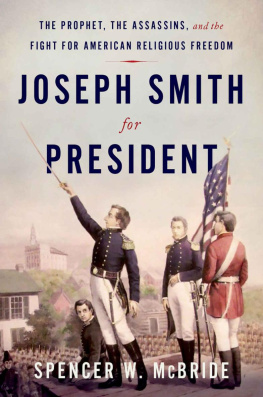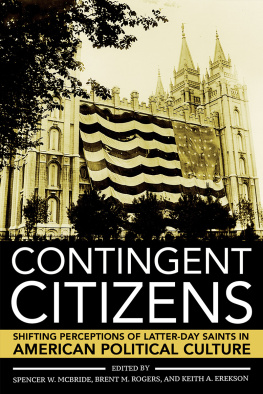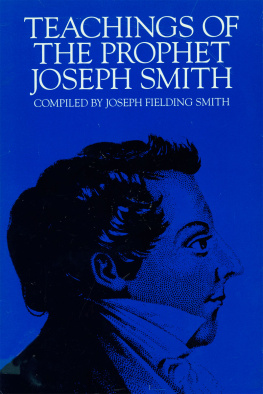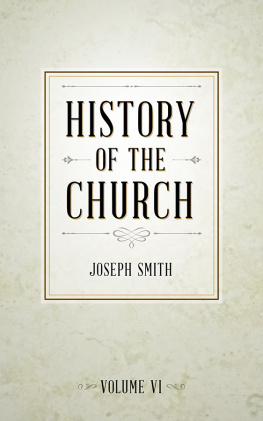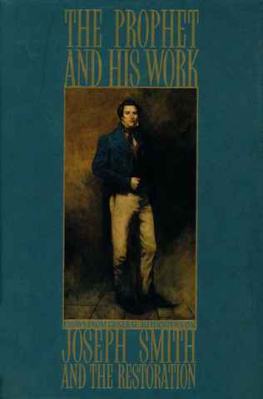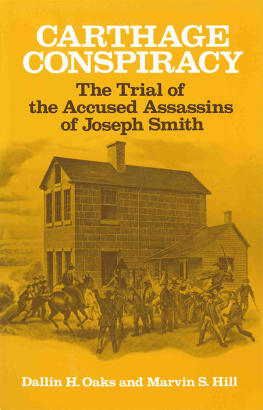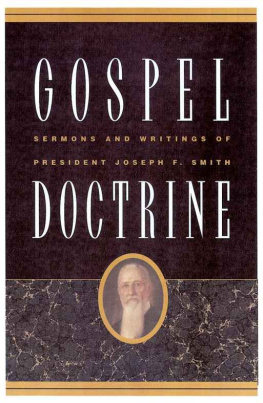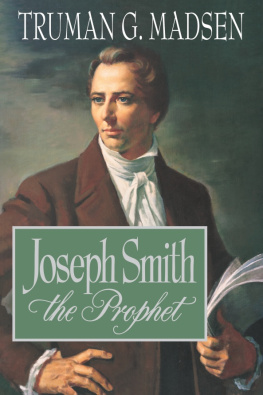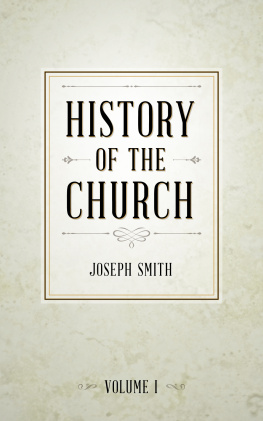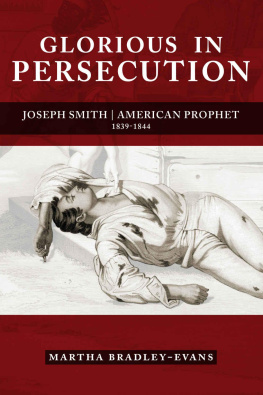JOSEPH SMITH FOR PRESIDENT
JOSEPH SMITH FOR PRESIDENT
...........
The Prophet, the Assassins, and the Fight for American Religious Freedom
SPENCER W. MCBRIDE


Oxford University Press is a department of the University of Oxford. It furthers the Universitys objective of excellence in research, scholarship, and education by publishing worldwide. Oxford is a registered trade mark of Oxford University Press in the UK and certain other countries.
Published in the United States of America by Oxford University Press 198 Madison Avenue, New York, NY 10016, United States of America.
Spencer W. McBride 2021
All rights reserved. No part of this publication may be reproduced, stored in a retrieval system, or transmitted, in any form or by any means, without the prior permission in writing of Oxford University Press, or as expressly permitted by law, by license, or under terms agreed with the appropriate reproduction rights organization. Inquiries concerning reproduction outside the scope of the above should be sent to the Rights Department, Oxford University Press, at the address above.
You must not circulate this work in any other form and you must impose this same condition on any acquirer.
Library of Congress Cataloging-in-Publication Data Names: McBride, Spencer W., author.
Title: Joseph Smith for President : the prophet, the assassins, and the fight for American religious freedom / Spencer W. McBride.
Description: New York, NY, United States of America : Oxford University Press, [2021] |
Includes bibliographical references and index.
Identifiers: LCCN 2020051798 (print) | LCCN 2020051799 (ebook) |
ISBN 9780190909413 (hb) | ISBN 9780190909437 (epub) Subjects: LCSH: Smith, Joseph, Jr., 18051844Political activity. |
Church of Jesus Christ of Latter-day SaintsPolitical activity. |
PresidentsUnited StatesElection1844. |
Presidential candidatesUnited StatesBiography. |
Political campaignsUnited StatesHistory19th century.
Classification: LCC BX8695.S6 M287 2021 (print) | LCC BX8695.S6 (ebook) |
DDC 289.3092 [B]dc23
LC record available at https://lccn.loc.gov/2020051798
LC ebook record available at https://lccn.loc.gov/2020051799
DOI: 10.1093/oso/9780190909413.001.0001
To my parents, Monroe and Laurie McBride
Contents
in researching and writing this book, I benefited from the support of many others. Ultimately, I alone am responsible for the books content, but I am delighted to acknowledge the assistance I received.
Several friends and colleagues read drafts of the manuscript in part or in full and offered constructive feedback. These individuals include Mason Allred, Bryon Andreasen, Mark Cheathem, Steve Evans, Brian Franklin, Matthew Godfrey, Amy Greenberg, Adam Jortner, Jody Lane, Brent Rogers, and Alex Smith. I refined my arguments with frequent conversations, both in person and via text message, with friend and fellow historian Benjamin Park. Through much of this time, Ben was researching his own book project about Nauvoo, Illinois, and it was helpful to compare notes and ideas with him.
I have spent years immersed in Joseph Smiths surviving documents as a historian at the Joseph Smith Papers Project. My colleagues on that projectindividually and collectivelycontain a wealth of knowledge about Smith and early Latter-day Saint history from which I gratefully benefited. For this I especially thank Mark Ashurst-McGee, Brett Dowdle, David Grua, Christian Heimburger, Sharalyn Howcroft, Robin Jensen, J. Chase Kirkham, Elizabeth Kuehn, Jeffrey Mahas, Jessica Nelson, Sharon Nielsen, and Adam Petty. The leadership of the Church History Department, the institutional home of the Joseph Smith Papers, has been supportive of my research endeavors, particularly Legrand Curtis Jr., Matthew Grow, Matthew McBride, Kyle McKay, Reid Neilson, and Steven Snow. That department also has a group of scholars who meet to critique works in progress, and this book benefited from the feedback that members of that group provided. Those members included Anne Berryhill, Christopher Blythe, Joseph Darowski, Kay Darowski, Alan Morrell, Jacob Olmstead, Steve Olsen, Ben Pykles, Mark Staker, Emily Utt, and Jordan Watkins. With an office in the heart of a research library, I never ceased to marvel that I could work with many of the relevant primary source documents at my own desk. I thank the many staff members of the Church History Library in Salt Lake City for their assistance in accessing these records.
I am fortunate that several of my professors from my days as a graduate student have become close friends. In particular I thank Andrew Burstein and Nancy Isenberg, who were instrumental in helping me publish my first book and assisting me in refining the ideas and arguments of this project.
This book was further refined through feedback that I obtained when presenting on related material to several scholarly organizations, including the Center for Presidential History at Southern Methodist University, the Society for Historians of the Early American Republic (SHEAR), the American Historical Association, the American Society of Church History, the Mormon History Association, and a special symposium on Mormons in American political culture. SHEARs inaugural Second Book Workshop in 2017 was a tremendous help for navigating the world of publishing.
I thank my literary agent Rebecca Friedman, who believed in this project from the start and worked hard to make it a reality. Similarly, it was a pleasure to work with the wonderful team at Oxford University Press, especially my editor, Theo Calderara.
In acknowledgment sections of books, family members are often listed last. This may be merely convention for some, but for me, I save my family members for the end because their contributions are the most difficult to adequately enumerate and my gratitude for them the most difficult to sufficiently articulate. May their placement in these pages be read as a sign of my deepest appreciation. Kris and Gail Budinger, my father-in-law and mother-in-law, have long been strong supporters of my research and writing and I thank them for this. Monroe and Laurie McBride, my parents and the people to whom this book is dedicated, were my first teachers. At an early age they placed me on a path of historical inquiry that has led to a life of rewarding discovery. Most of all, I thank my wife, Lindsay, and our four children, Erik, Laney, Joshua, and Thomas, for their unconditional love and unwavering support.
this book relies heavily on nineteenth-century documents in which the spelling and grammar is often erratic. In quotations from these documents I have preserved the original spelling and grammar.
The church founded by Joseph Smith in 1830 was called the Church of Christ. In 1834 the name changed to the Church of the Latter Day Saints. Then, in 1838, the church adopted the name the Church of Jesus Christ of Latter-day Saints. While this has remained the churchs official name since, throughout its history the church has been alternately referred to as the Mormon Church or the LDS Church. The term Mormon has also been used to refer to other individuals, institutions, and practices that trace their origins to Joseph Smith. When referring to members of the Church of Jesus Christ of Latter-day Saints in this book, I have used Mormons, Latter-day Saints, and Saints interchangeably, just as church members of the 1830s and 1840s did.

